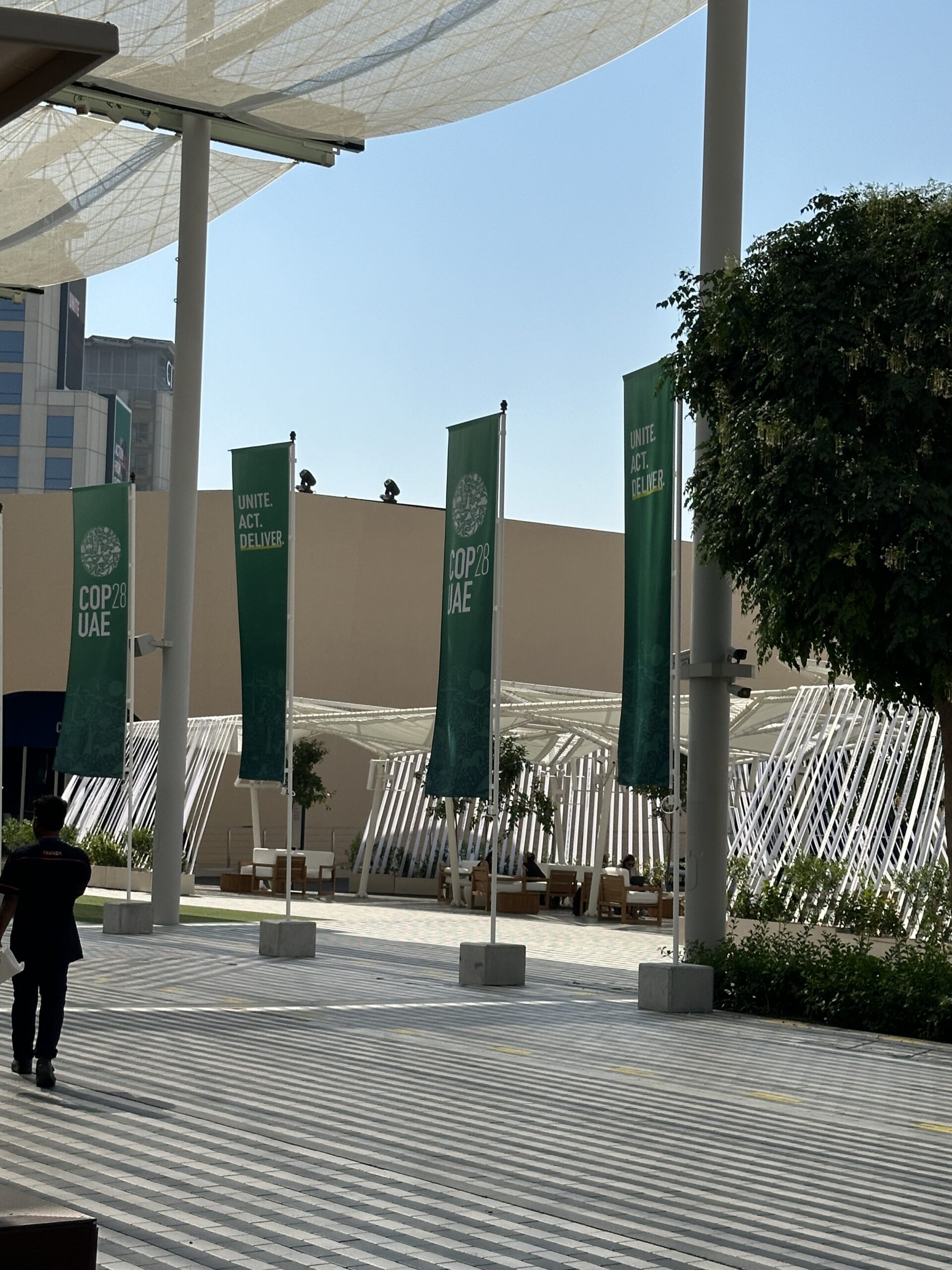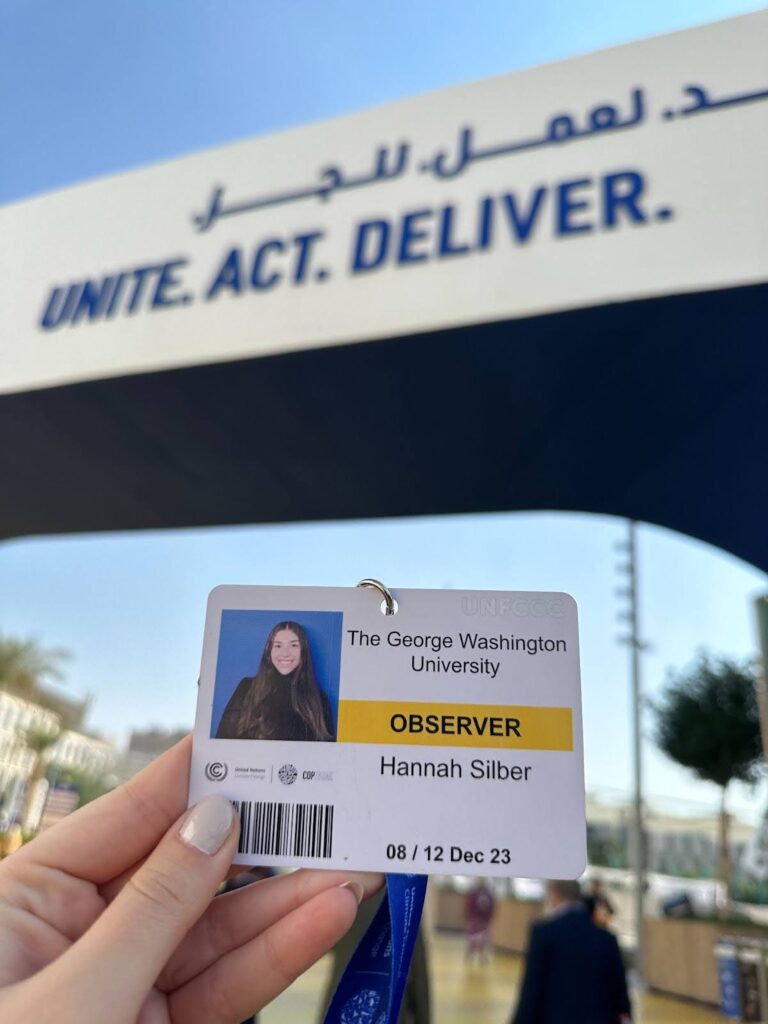
Hannah Silber

Hannah Silber
At COP28, the words of Vanessa Nakate, a Ugandan climate activist, resonated with me: “If you want to fight malaria, you don’t invite the mosquitoes.” In other words, if you want to fight climate change, you can’t rely on the oil companies. The people most affected must be given the opportunity to take action.
This approach places the spotlight on inclusion and the need for true unity and representation of all historically marginalized groups to act on climate change and deliver progress. All voices must have a seat at the table, particularly communities bearing the brunt of climate change impacts. As I learned, these groups will persist, continue to share their stories, and demand climate action. As students with the power to make change on our campus and beyond, we should remember that our voices, when consistent in advocating for our beliefs, have the ability to facilitate change.
COP28 was the setting for discussions and eventual negotiation between relevant diplomats to set the agenda for climate progress and international collaboration. The words “Unite,” “Act,” and “Deliver,” plastered across nearly all of the 1,000 acres of the conference grounds sparked an optimistic and confident tone for the conference to accomplish momentous climate action. With unity in mind, I had a deep-seated hope to witness the representation and inclusion of all relevant groups – small communities, climate activists, those bearing the brunt of climate change – at the negotiation tables.

But that is not what I saw and not what I heard. Unfortunately, we heard a lot of empty promises from negotiators and outcry from observers. What struck me the most while attending press conferences, pavilion meetings, and simply walking the grounds of COP28 were the deep emotions individuals and groups experienced when sharing about how their homes have been impacted by climate change.
Despite public outcry, much of the deliberations remained private, with negotiators bouncing between formal meetings contributing to draft texts while observers and participants dressed in the traditional clothing of their people, nations, and cultures remained outside anxiously waiting for results that would secure climate change action in accordance with the Paris Agreement.
On the night before the last day of the conference, to much chagrin of many conference participants, the draft document of the final negotiations included the goal of reaching a gradual phase down of unabated coal. Coal? But what about fossil fuels, natural gas, and of course oil–the very lifeblood of countries in that region including the UAE. The next morning, heavy hearts filled the empty spaces left by many of the already departed participants and observers. Much of the schedule on this day was filled with NGO press conferences so that organizations could give their statements on what had been assumed to be some of the final documents coming out of the negotiations.
In response to the lackluster draft negotiation document, those remaining as the clock ticked down on COP28 expressed disappointment. “We continue to come because this is the only option,” said climate activist Joseph Sikulu as tears streamed down his face. His words continue to ring through my ears to this day.
Throughout the conference, I had questioned how communities that face the brunt of climate change impacts, despite not contributing to the problem, maintain resilience at conferences that repeatedly seem to disregard their advocacy. But in that resounding statement, I came to better understand that the urgency of the existential threat that climate change poses, will continue to mandate that the will of the people be heard.
As a college campus uniquely positioned in the nation’s capital, we too have the opportunity to organize and fight for climate change policy and action. As I have seen climate protests on our campus and around the District, I have similarly questioned how groups continue to find motivation even when policy responses seem to ignore the problem. And yet, I found some resolve in the conversations I heard at COP. It is the very people continuing to fight for climate justice despite the obstacles that will make change–simply because that is the only option.
Even so, as students, we still largely remain siloed from many of the concerns that small communities with little representation are already facing on their home fronts. News articles that saturate our feeds with global climate issues quickly become stories and statistics rather than representations of people and communities. COP28 provided me an opportunity to truly see beyond my college campus and words written in the newspaper. I came face-to-face with representatives of communities that must manage responses to climate change even as climate negotiations continue to disregard their needs and make minimal progress.
And while this year’s climate conference ended with an unprecedented mention of fossil fuels in the final text, those already affected by climate change know that these statements are not enough to protect their homes and adequately address most communities’ needs.
Looking forward to COP29, which will be held in Azerbaijan, another petrostate, negotiators should focus more directly on the needs of smaller communities. With more than 1,200 oil lobbyists roaming around the grounds of COP28 and international companies boasting about their sustainability initiatives, I felt as if the platform for small nations, Indigenous groups, and communities hit hardest by the immediate impacts of climate change was insufficient. If “Unite,” “Act,” and “Deliver,” remains the goal for COP and overarching climate action, future conferences must uplift all voices while simultaneously setting standards for inclusion and equitable representation.